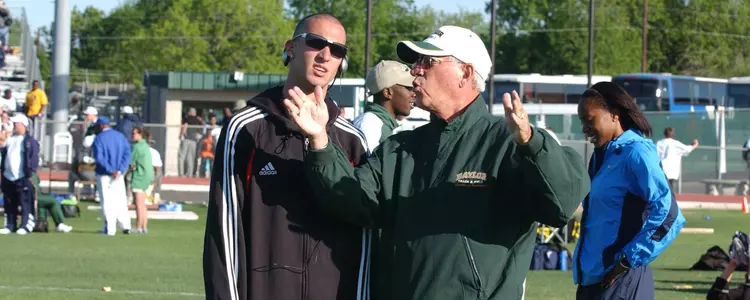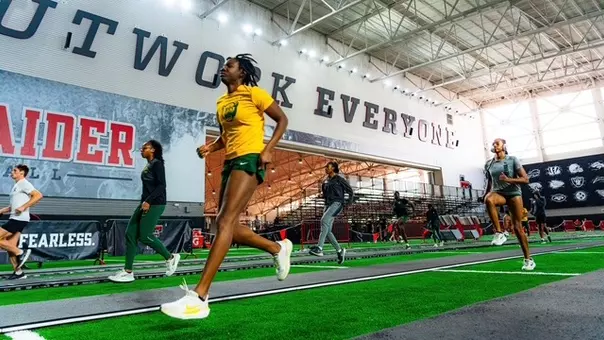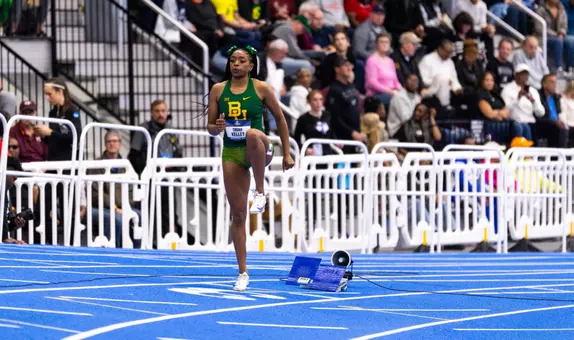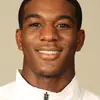
MORE THAN A QUARTER-MILER COACH
4/17/2019 9:38:00 AM | General, Track & Field
Clyde Hart Takes Pride in Building Women’s Program, Success Across the Board.
By Jerry Hill
Baylor Bear Insider
Few track coaches, if any, can come close to the success that Clyde Hart has had in tutoring the world's best quarter-milers.
Michael Johnson and Jeremy Wariner won eight Olympic gold medals between them and dominated the event for more than a decade, winning the 400 meters at three consecutive Olympics from 1996 to 2004.
 On the collegiate level, since taking over at Baylor for Jack Patterson in 1963, he has coached 34 national champions (14 individual, 20 relay) and a mind-blowing 566 All-America performances.
On the collegiate level, since taking over at Baylor for Jack Patterson in 1963, he has coached 34 national champions (14 individual, 20 relay) and a mind-blowing 566 All-America performances.
Despite all that, the 85-year-old Hart doesn't want to remembered as just a quarter-miler coach, the man who turned Baylor into Quarter-Miler U.
"I told my wife, on my tombstone, don't put that I was a quarter-miler coach," he said. "I was a track coach."
Yes, and a Hall of Fame-worthy one at that – he's already been inducted into the Texas Sports, Arkansas Sports, Baylor Athletic and USA Track & Field Coaches Association halls of fame. And still is a track coach, at least for a couple more months.
While he stepped away from head coaching duties 14 years ago, staying on as Director of Track & Field, Hart has announced that he will retire from coaching at the end of this season. It's not just the end of an era, this seems much bigger than that.
Clyde Hart – Coach Hart – has been the face of the Baylor track and field program for nearly six decades.
"The longevity, not just with the 400 but across the board, our program has always been highly respected throughout the country and throughout the world," said current head coach Todd Harbour, who set the collegiate record in the mile (3:50.34) in 1981 while running for Hart. "Coach Hart has his hand all over that."
As he steps away from the track that actually bears his name, that's the thing that makes Hart the proudest. Certainly, his name is known internationally as arguably the best quarter-miler coach ever. But, he coached state champions in multiple events at Little Rock Central High School (1957-63) and didn't get a full-time assistant coach at Baylor until the late 1970s.
"At Baylor, I coached the first 60-foot shot-putter, had the first 26-foot long jumper, the first 7-foot high jumper, first sub-4-minute miler. I coached all of those," he said. "Actually, I enjoyed coaching the half-mile probably more than the quarter-mile and had more success early on in the half. And probably lectured more on the long jump than anything. At one point, we had three kids jumping 25 feet, and one of those was a walk-on."
Looking back on a coaching career that has spanned seven different decades, the thing that he's as proud of as any of the gold medals or NCAA championships is "just to see how far the women's program has come."
Hart actually gave up one of his men's track scholarships, allowing Baylor to sign one of the best athletes in Central Texas history in Robinson's Suzie Snider in 1973. She held the school's shot put and discus records for more than 30 years, but Snider made her biggest mark on the basketball court with a record 3,861 career points, which still stands as the most ever by a college player.
The Baylor president at the time was adamant about not awarding scholarships to female athletes, but Hart got the athletic director to agree to the arrangement. Technically, Snider was on a track scholarship during her four-year basketball career.
With Baylor's move from AIAW to NCAA in 1982, "we already had a foot in the door," said Hart, who signed distance runner Sandy Forsythe to the first women's track scholarship. She set the program records in the 1,500 and 5,000 meters and still holds the mark for the 3,000.
Eventually, given approval to sign 10 female athletes to presidential tuition scholarships, Hart brought in a class that included six-time All-American Natale Nalepa, a Hall of Famer that was named the Southwest Conference's top distance runner of the century.
"We also won a relay championship out of that group, so that was kind of the start," he said. "We kept adding until we got the full allotment allowed by the NCAA, which was 16 and is now 18. That's how the women's program got going. With Kim (Mulkey) winning the national championship, all that ties in, it helps the overall program of the university."
A standout sprinter from Hot Springs, Ark., Hart graduated from Baylor in 1956 and got his first coaching job a year later as the head track coach and trainer at Little Rock Central High School. His first official day was Sept. 11, 1957, when the school integrated with the "Little Rock Nine."

He also became the junior varsity football coach, giving Hart a chance to spot talent for the track team. Tommy Maddox, who had been the center because he was the only one who could snap the ball in junior high, was switched to halfback and eventually won a state championship in the 100 meters.
His list of track pupils at Central also included state champion pole vaulter Darrell Ward, who followed Hart to Baylor, and a high jumper that was ranked No. 2 in the country.
"I had to learn all that by coaching in high school," he said. "You do what you've got to do. . . . I've always said that every coach should have to coach high school for a minimum of five years. Seriously. And at a smaller school where you've got to mow the grass and line the field and do all that stuff, because I've done it all."
That included turning a red-clay track with a cyclone fence around it into what eventually became the Hart/Patterson Track & Field Stadium.
"That's it, no restrooms, no locker room, no lights," Hart said.
 Since the pole vault and high jump had sand-filled landing pits, the first thing Hart did was take foam rubber scraps donated from LL Sams, stuffed them into big laundry bags "and made a foam rubber pit. I did that in high school."
Since the pole vault and high jump had sand-filled landing pits, the first thing Hart did was take foam rubber scraps donated from LL Sams, stuffed them into big laundry bags "and made a foam rubber pit. I did that in high school."
From there, "piece by piece," he built it into a respected college facility that hosted conference championships. Hart got a donation from the Cooper Foundation to build a locker room below the stands, then wrote up a proposal for an agreement with the City of Waco and Waco ISD to put in an all-weather track and concrete Waco Creek, "because it was flooding that whole neighborhood."
Another fundraising campaign brought in $2 million to remodel the stadium in 1976, including adding seating and a state-of-the-art scoreboard and resurfacing the track.
Hart said it was a "dream come true" when the new $18.1 million Clyde Hart Track and Field Stadium was dedicated on Dec. 5, 2014, just months after the first football game at McLane Stadium.
"It was very hard for me to visualize a football stadium, much less a track stadium on this piece of property," Hart said of the new track facility that was built on the banks of the Brazos, next to McLane Stadium. "I look out my window every day and try to figure out what else could have been done, and there's not anything. It's more than I ever dreamed possible."
Saying he honestly feels "as good today as I did 20, 30 years ago," Hart said he's not retiring because of any health issues. But, "a month from now my health may not be the same," he said. "As you get older, certainly the odds are that you can't count on that."
So, Coach, why retire now?
"Why not now?" he said. "My wife (Maxine) would say, 'OK, when are you going to retire?' And I would say that I've got to see so-and-so through. And then she finally said, 'That will never end, because there's always going to be another one coming up.' I kind of had to draw a line in the sand, and Wil London, being the local kid (from Waco High) and I recruited him, I wanted to see him through, for sure.
"I'm 85, I definitely need to spend more time with my wife and just do some things. You just have to move on at some point. And I thought with Wil finishing up, that's the point."
Part of the Baylor family for most of his life, Clyde said he still wants to be around and "be a presence somewhere, but I'm certainly not going to make a pest of myself or get in people's way. People need to make their own identity. They need to be able to move on. It's just time."
Hart will be honored at a dinner Friday night at the Baylor Club on the opening day of the Michael Johnson Invitational, with a crowd of more than 300 expected to attend, including many of his former student-athletes.
"I will miss the athletes, No. 1," he said. "And I will miss the coaches. That's the hardest part, I believe, for any coach when he leaves. I'm sure (former Baylor football coach Grant Teaff) felt the same way. It's that fraternity you're in. And not just the coaches, but the entire athletic department staff, you have a family. We preach family from the word go. That will never change."

Baylor Bear Insider
Few track coaches, if any, can come close to the success that Clyde Hart has had in tutoring the world's best quarter-milers.
Michael Johnson and Jeremy Wariner won eight Olympic gold medals between them and dominated the event for more than a decade, winning the 400 meters at three consecutive Olympics from 1996 to 2004.
 On the collegiate level, since taking over at Baylor for Jack Patterson in 1963, he has coached 34 national champions (14 individual, 20 relay) and a mind-blowing 566 All-America performances.
On the collegiate level, since taking over at Baylor for Jack Patterson in 1963, he has coached 34 national champions (14 individual, 20 relay) and a mind-blowing 566 All-America performances.Despite all that, the 85-year-old Hart doesn't want to remembered as just a quarter-miler coach, the man who turned Baylor into Quarter-Miler U.
"I told my wife, on my tombstone, don't put that I was a quarter-miler coach," he said. "I was a track coach."
Yes, and a Hall of Fame-worthy one at that – he's already been inducted into the Texas Sports, Arkansas Sports, Baylor Athletic and USA Track & Field Coaches Association halls of fame. And still is a track coach, at least for a couple more months.
While he stepped away from head coaching duties 14 years ago, staying on as Director of Track & Field, Hart has announced that he will retire from coaching at the end of this season. It's not just the end of an era, this seems much bigger than that.
Clyde Hart – Coach Hart – has been the face of the Baylor track and field program for nearly six decades.
"The longevity, not just with the 400 but across the board, our program has always been highly respected throughout the country and throughout the world," said current head coach Todd Harbour, who set the collegiate record in the mile (3:50.34) in 1981 while running for Hart. "Coach Hart has his hand all over that."
As he steps away from the track that actually bears his name, that's the thing that makes Hart the proudest. Certainly, his name is known internationally as arguably the best quarter-miler coach ever. But, he coached state champions in multiple events at Little Rock Central High School (1957-63) and didn't get a full-time assistant coach at Baylor until the late 1970s.
"At Baylor, I coached the first 60-foot shot-putter, had the first 26-foot long jumper, the first 7-foot high jumper, first sub-4-minute miler. I coached all of those," he said. "Actually, I enjoyed coaching the half-mile probably more than the quarter-mile and had more success early on in the half. And probably lectured more on the long jump than anything. At one point, we had three kids jumping 25 feet, and one of those was a walk-on."
Looking back on a coaching career that has spanned seven different decades, the thing that he's as proud of as any of the gold medals or NCAA championships is "just to see how far the women's program has come."
Hart actually gave up one of his men's track scholarships, allowing Baylor to sign one of the best athletes in Central Texas history in Robinson's Suzie Snider in 1973. She held the school's shot put and discus records for more than 30 years, but Snider made her biggest mark on the basketball court with a record 3,861 career points, which still stands as the most ever by a college player.
The Baylor president at the time was adamant about not awarding scholarships to female athletes, but Hart got the athletic director to agree to the arrangement. Technically, Snider was on a track scholarship during her four-year basketball career.
With Baylor's move from AIAW to NCAA in 1982, "we already had a foot in the door," said Hart, who signed distance runner Sandy Forsythe to the first women's track scholarship. She set the program records in the 1,500 and 5,000 meters and still holds the mark for the 3,000.
Eventually, given approval to sign 10 female athletes to presidential tuition scholarships, Hart brought in a class that included six-time All-American Natale Nalepa, a Hall of Famer that was named the Southwest Conference's top distance runner of the century.
"We also won a relay championship out of that group, so that was kind of the start," he said. "We kept adding until we got the full allotment allowed by the NCAA, which was 16 and is now 18. That's how the women's program got going. With Kim (Mulkey) winning the national championship, all that ties in, it helps the overall program of the university."
A standout sprinter from Hot Springs, Ark., Hart graduated from Baylor in 1956 and got his first coaching job a year later as the head track coach and trainer at Little Rock Central High School. His first official day was Sept. 11, 1957, when the school integrated with the "Little Rock Nine."

He also became the junior varsity football coach, giving Hart a chance to spot talent for the track team. Tommy Maddox, who had been the center because he was the only one who could snap the ball in junior high, was switched to halfback and eventually won a state championship in the 100 meters.
His list of track pupils at Central also included state champion pole vaulter Darrell Ward, who followed Hart to Baylor, and a high jumper that was ranked No. 2 in the country.
"I had to learn all that by coaching in high school," he said. "You do what you've got to do. . . . I've always said that every coach should have to coach high school for a minimum of five years. Seriously. And at a smaller school where you've got to mow the grass and line the field and do all that stuff, because I've done it all."
That included turning a red-clay track with a cyclone fence around it into what eventually became the Hart/Patterson Track & Field Stadium.
"That's it, no restrooms, no locker room, no lights," Hart said.
 Since the pole vault and high jump had sand-filled landing pits, the first thing Hart did was take foam rubber scraps donated from LL Sams, stuffed them into big laundry bags "and made a foam rubber pit. I did that in high school."
Since the pole vault and high jump had sand-filled landing pits, the first thing Hart did was take foam rubber scraps donated from LL Sams, stuffed them into big laundry bags "and made a foam rubber pit. I did that in high school."From there, "piece by piece," he built it into a respected college facility that hosted conference championships. Hart got a donation from the Cooper Foundation to build a locker room below the stands, then wrote up a proposal for an agreement with the City of Waco and Waco ISD to put in an all-weather track and concrete Waco Creek, "because it was flooding that whole neighborhood."
Another fundraising campaign brought in $2 million to remodel the stadium in 1976, including adding seating and a state-of-the-art scoreboard and resurfacing the track.
Hart said it was a "dream come true" when the new $18.1 million Clyde Hart Track and Field Stadium was dedicated on Dec. 5, 2014, just months after the first football game at McLane Stadium.
"It was very hard for me to visualize a football stadium, much less a track stadium on this piece of property," Hart said of the new track facility that was built on the banks of the Brazos, next to McLane Stadium. "I look out my window every day and try to figure out what else could have been done, and there's not anything. It's more than I ever dreamed possible."
Saying he honestly feels "as good today as I did 20, 30 years ago," Hart said he's not retiring because of any health issues. But, "a month from now my health may not be the same," he said. "As you get older, certainly the odds are that you can't count on that."
So, Coach, why retire now?
"Why not now?" he said. "My wife (Maxine) would say, 'OK, when are you going to retire?' And I would say that I've got to see so-and-so through. And then she finally said, 'That will never end, because there's always going to be another one coming up.' I kind of had to draw a line in the sand, and Wil London, being the local kid (from Waco High) and I recruited him, I wanted to see him through, for sure.
"I'm 85, I definitely need to spend more time with my wife and just do some things. You just have to move on at some point. And I thought with Wil finishing up, that's the point."
Part of the Baylor family for most of his life, Clyde said he still wants to be around and "be a presence somewhere, but I'm certainly not going to make a pest of myself or get in people's way. People need to make their own identity. They need to be able to move on. It's just time."
Hart will be honored at a dinner Friday night at the Baylor Club on the opening day of the Michael Johnson Invitational, with a crowd of more than 300 expected to attend, including many of his former student-athletes.
"I will miss the athletes, No. 1," he said. "And I will miss the coaches. That's the hardest part, I believe, for any coach when he leaves. I'm sure (former Baylor football coach Grant Teaff) felt the same way. It's that fraternity you're in. And not just the coaches, but the entire athletic department staff, you have a family. We preach family from the word go. That will never change."

Players Mentioned
Baylor Cross Country: My Baylor Story - Jack Sterrett
Saturday, December 20
Baylor Track and Field: Coach Clyde Hart Tribute
Thursday, November 06
Baylor Cross Country: David Barnett on the Baylor Coach's Show | August 20, 2025
Friday, August 22
Baylor Track & Field: NCAA Championship Highlights | June 11-14, 2025
Monday, June 16




















